Charles E W Bean, Diaries, AWM38 3DRL 606/116/1 - June - September 1918 - Part 1
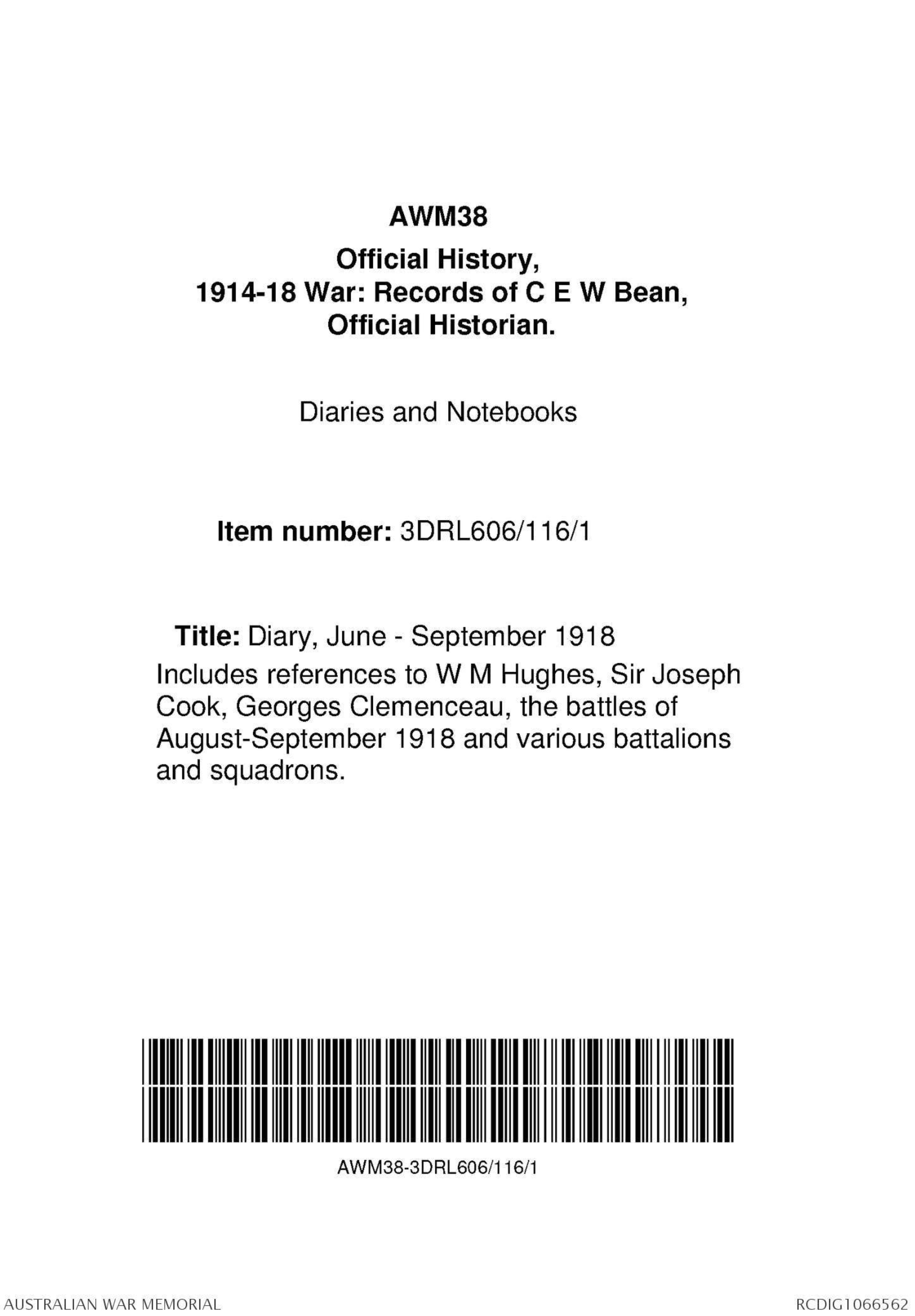
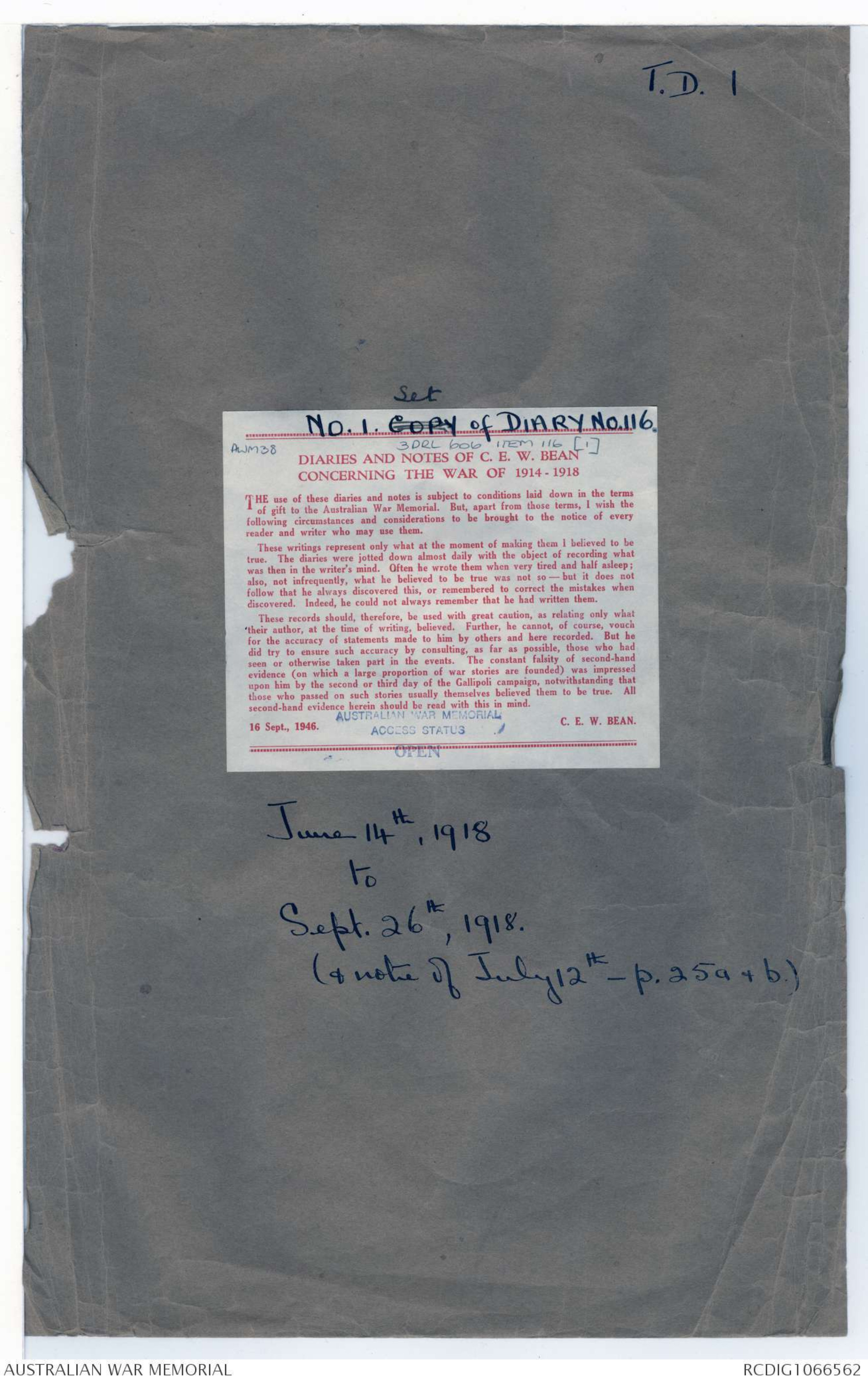
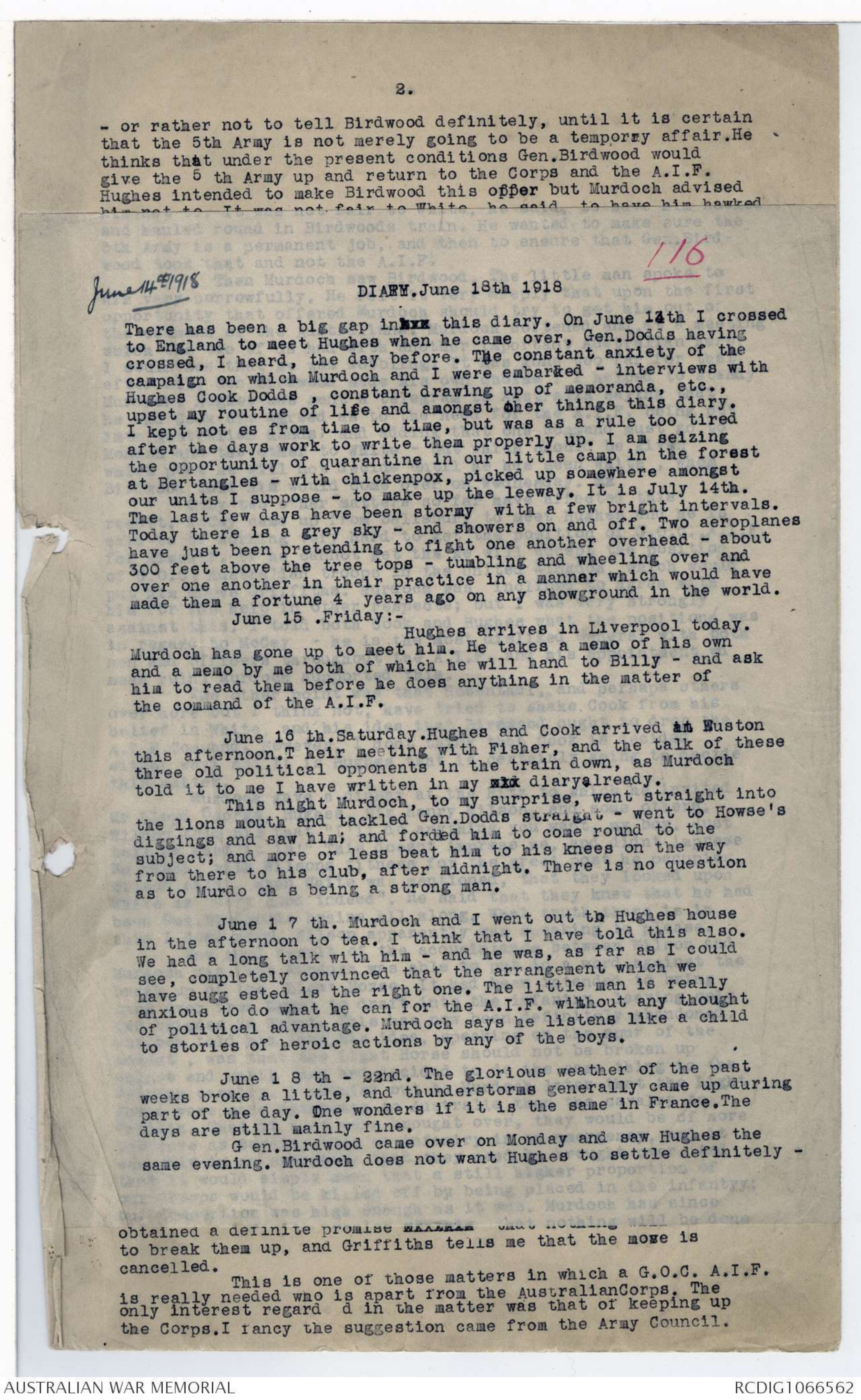
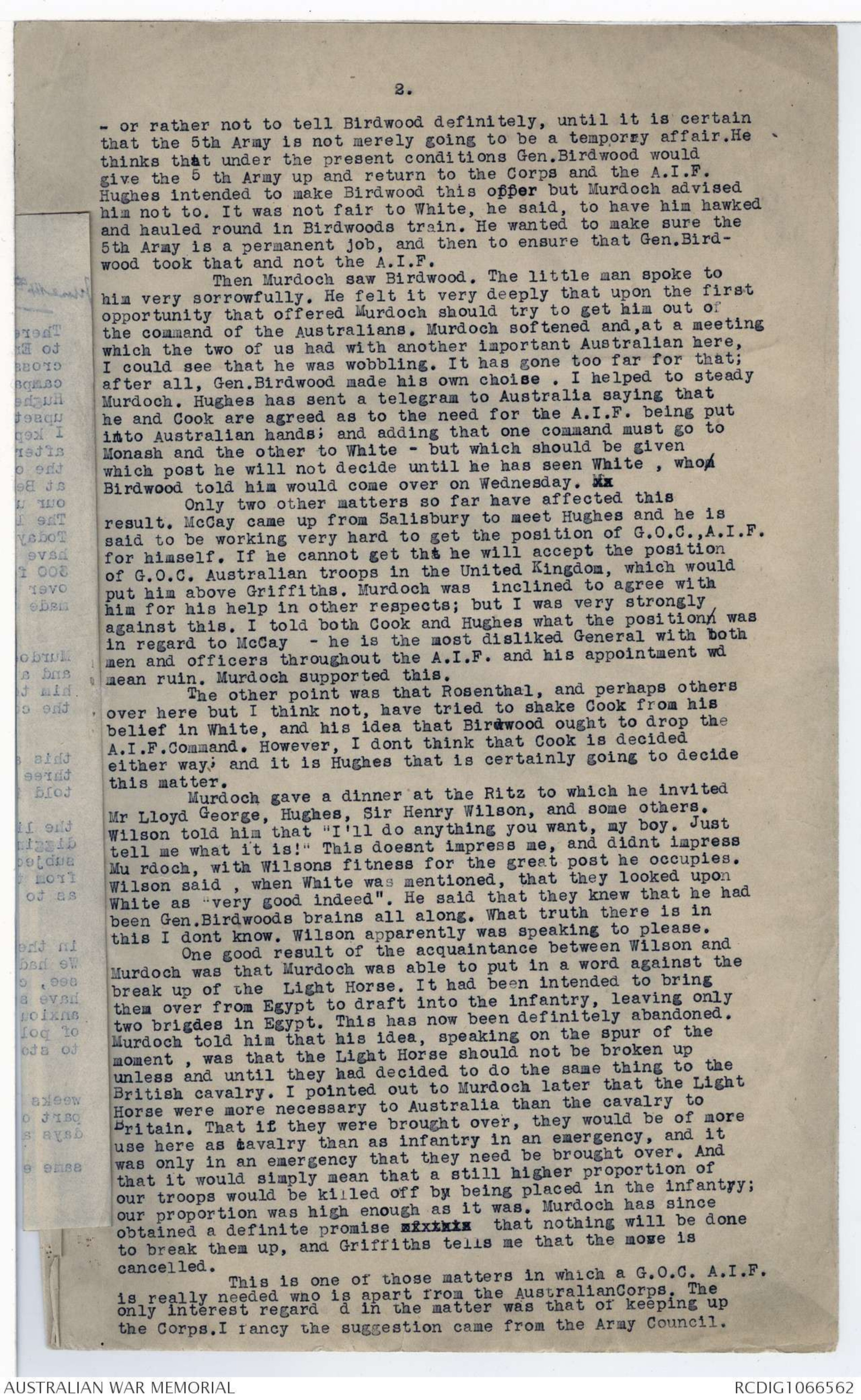
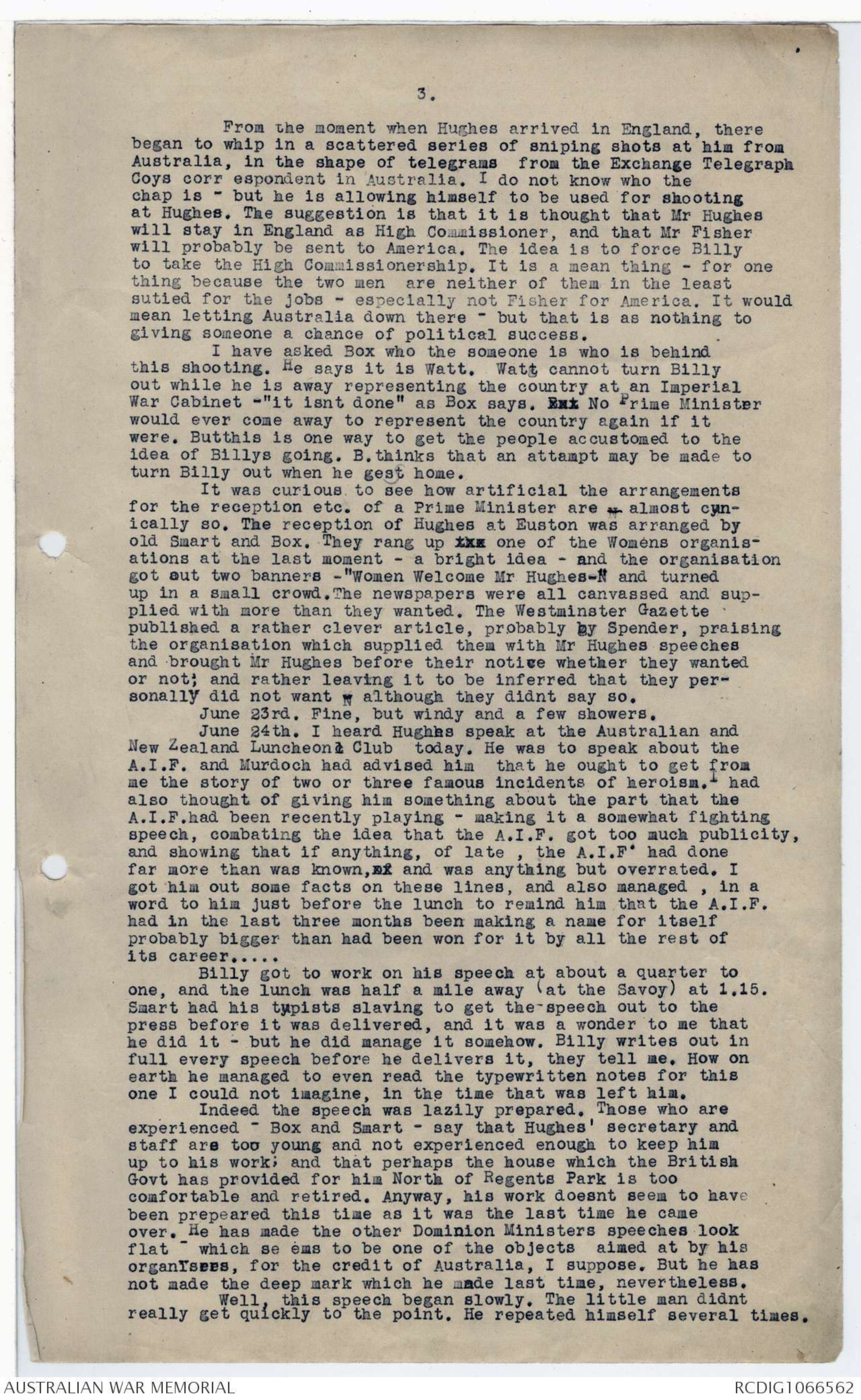
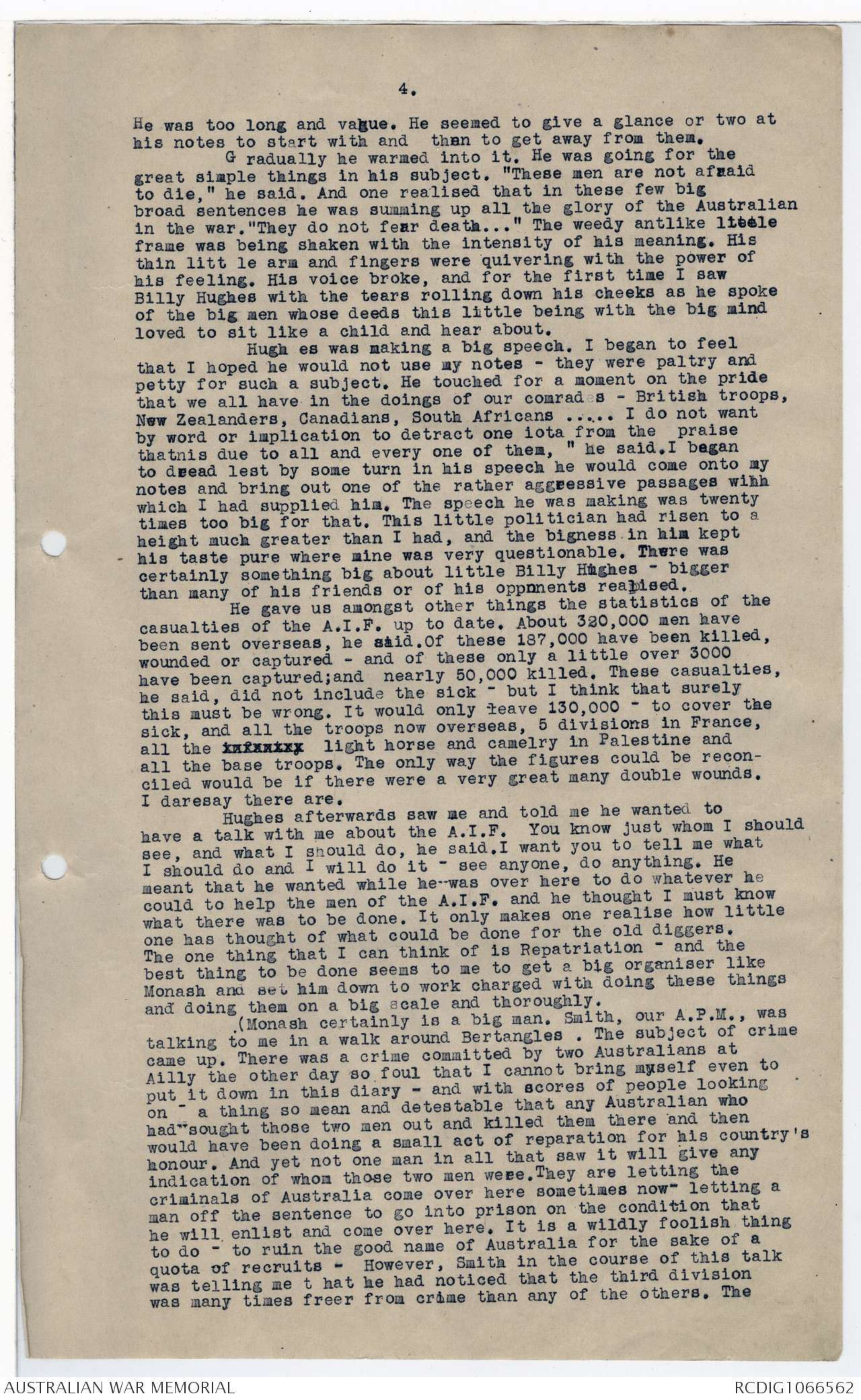
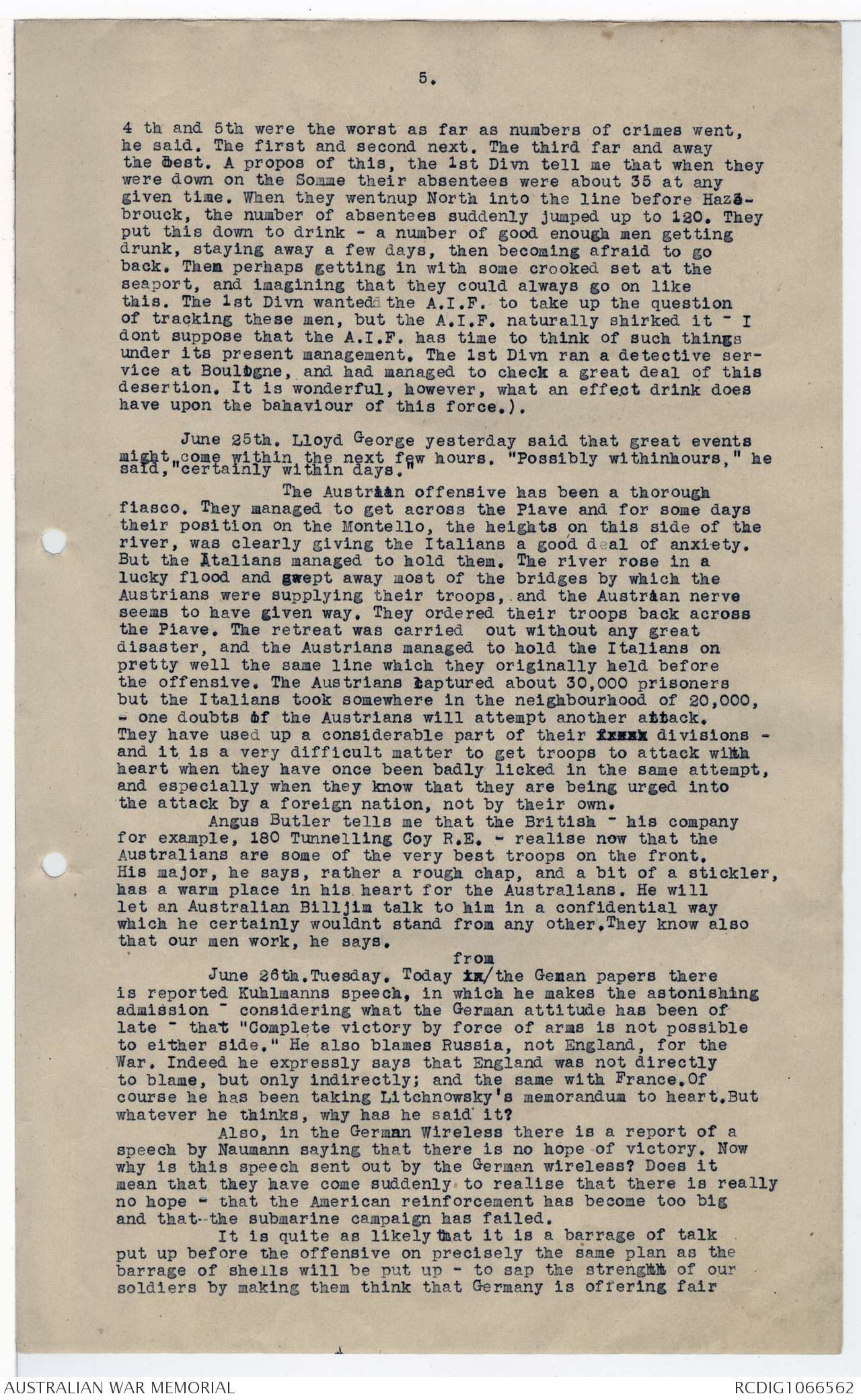
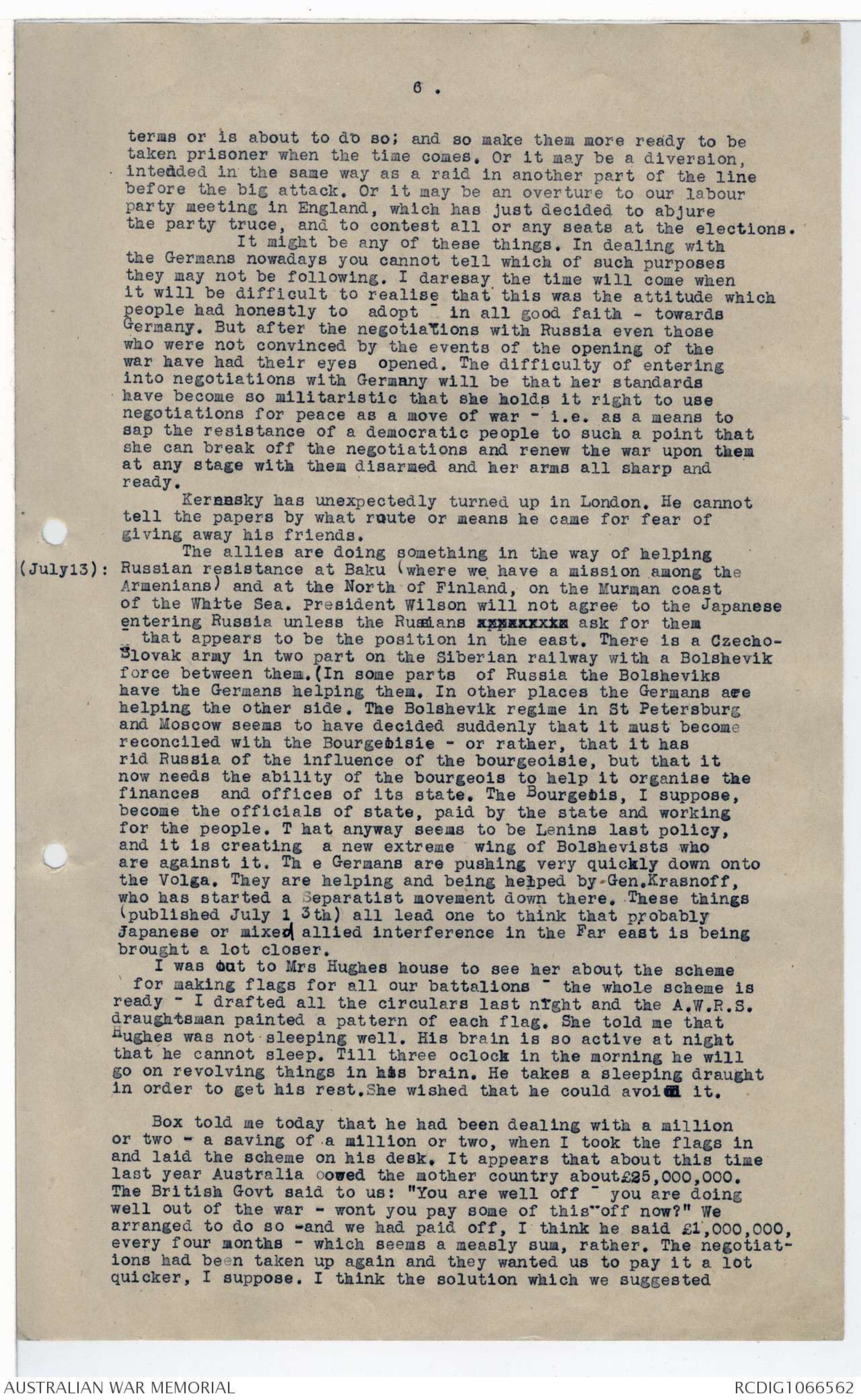
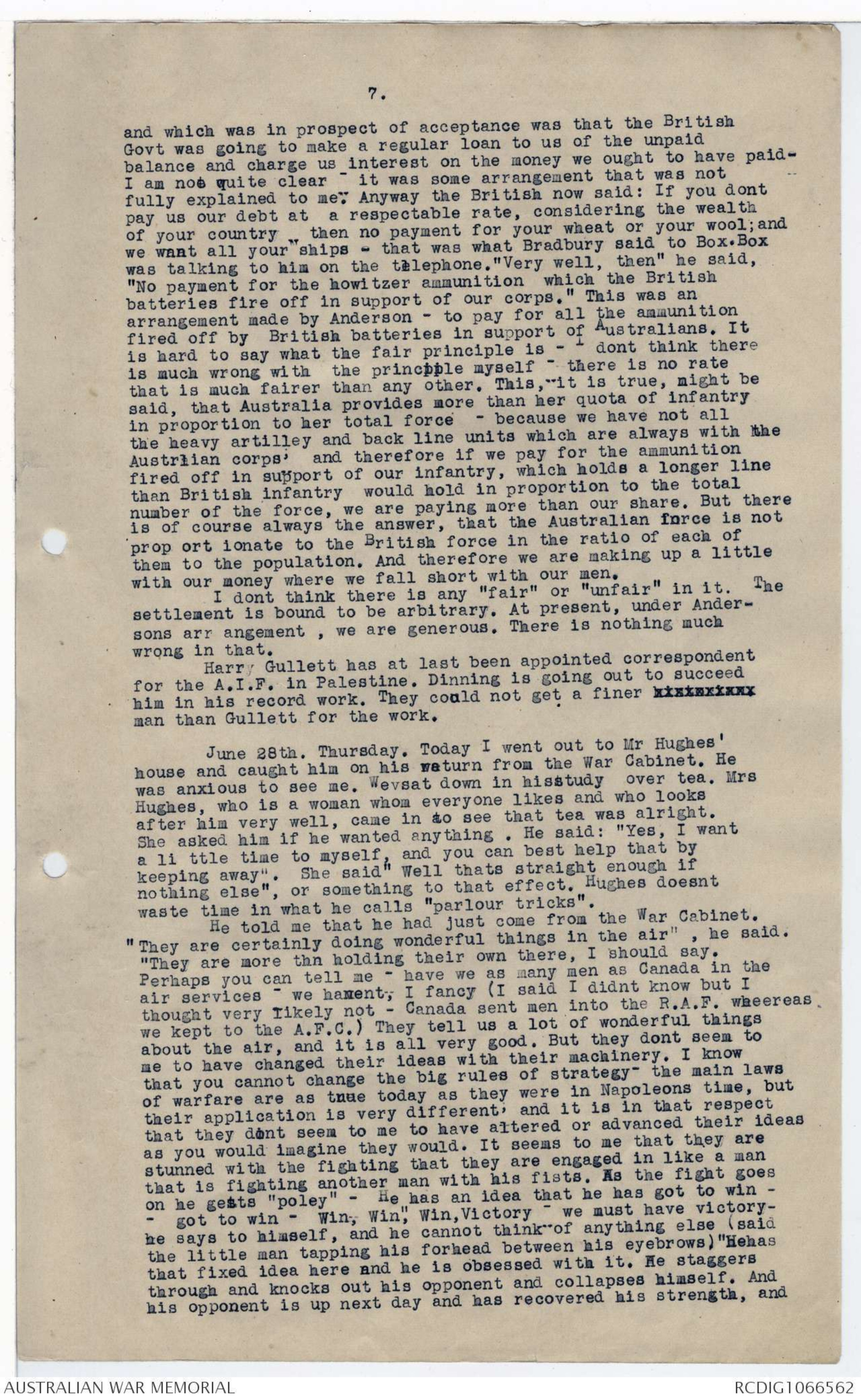
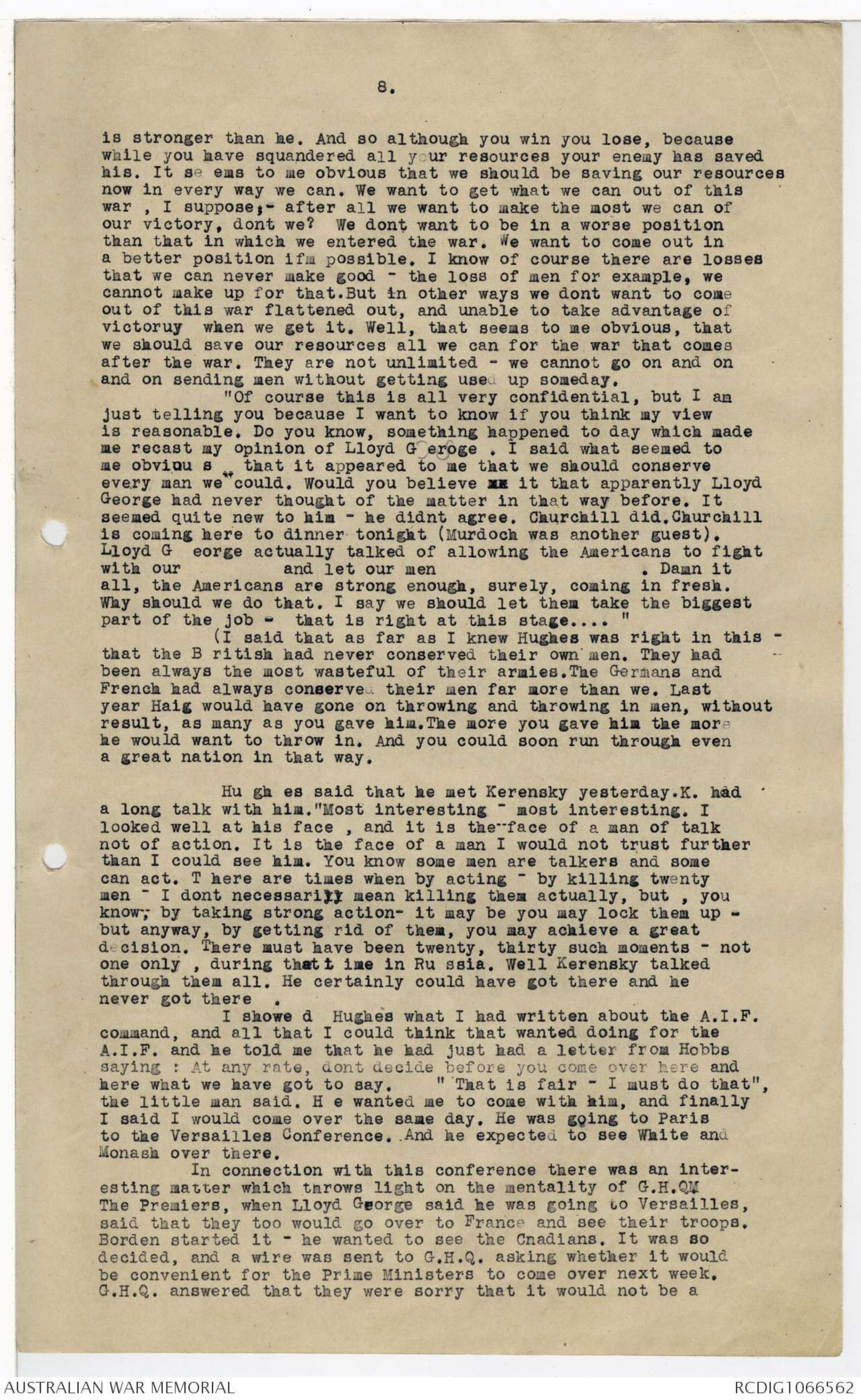
AWM38
Official History,
1914-18 War: Records of C E W Bean,
Official Historian
Diaries and Notebooks
Item number:3DRL606/116/1
Title: Diary, June - September 1918
Includes references to W M Hughes, Sir Joseph
Cook, Georges Clemenceau, the battles of
August-September 1918 and various battalions
and squadrons.
AWM38-3DRL606/116/1
T.D.1
No. 1. COPY Set of DIARY No 116.
AJM38 3DRL 606 ITEM 116 [1]
DIARIES AND NOTES OF C.E.W. BEAN
CONCERNING THE WAR OF 1914 - 1918
The use of these diaries and notes is subject to conditions laid down in the terms
of gift to the Australian War memorial. But apart from these terms, I wish the
following circumstances and considerations to be brought to the notice of every
reader and writer who may use them.
These writings represent only what at the moment of making them I believed to be
true. The diaries were jotted down almost daily with the object of recording what
was then in the writer's mind. Often he wrote them when very tired and half-asleep;
also, not infrequently what he believed to be true was not so - but it does not
follow that he always discovered this, or remembered to correct the mistakes when
discovered. Indeed, he could not always remember that he had written them.
These records should therefore, be used with great caution, as relating only what
their author, at the time of writing believed. Further, he cannot, of course vouch
for the accuracy of statements made to him by others and here recorded. But he
did try to ensure such accuracy by consulting, as far as possible, those who had
seen or otherwise taken part in the events. The constant falsity of second-hand
evidence (on which a large proportion of war stories are founded) was impressed
upon him by the second or third day of the Gallipoli campaign, notwithstanding that
those who passed on such stories usually themselves believed them to be true. All
second-hand evidence herein should be read with this in mind.
16 Sep., 1946. C. E. W. BEAN
AUSTRALIAN WAR MEMORIAL
ACCESS STATUS
OPEN
June 14th, 1918
to
Sept. 26th, 1918.
(& note of July 12th - p.25a & b.)
June 14th1918
DIARY,June 18th 1918
116
There has been a big gap inxxx this diary. On June 12th I crossed
to England to meet Hughes when he came over, Gen.Dodds having
crossed, I heard, the day before. The constant anxiety of the
campaign on which Murdoch and I were embarked - interviews with
Hughes Cook Dodds , constant drawing up of memoranda, etc.,
upset my routine of life and amongst other things this diary.
I kept not es from time to time, but was as a rule too tired
after the days work to write them properly up. I am seizing
the opportunity of quarantine in our little camp in the forest
at Bertangles - with chickenpox, picked up somewhere amongst
our units I suppose - to make up the leeway. It is July 14th.
The last few days have been stormy with a few bright intervals.
Today there is a grey sky - and showers on and off. Two aeroplanes
have just been pretending to fight one another overhead - about
300 feet above the tree tops - tumbling and wheeling over and
over one another in their practice in a manner which would have
made them a fortune 4 years ago on any showground in the world.
June 15 .Friday:-
Hughes arrives in Liverpool today.
Murdoch has gone up to meet him. He takes a memo of his own
and a memo by me both of which he will hand to Billy - and ask
him to read them before he does anything in the matter of
the command of the A.I.F.
June 16 th.Saturday.Hughes and Cook arrived atin Euston
this afternoon.T heir meeting with Fisher, and the talk of these
three old political opponents in the train down, as Murdoch
told it to me I have written in my old diaryalready.
This night Murdoch, to my surprise, went straight into
the lions mouth and tackled Gen.Dodds straight - went to Howse's
diggings and saw him; and forced him to come round to the
subject; and more or less beat him to his knees on the way
from there to his club, after midnight. There is no question
as to Murdo ch s being a strong man.
June 1 7th. Murdoch and I went out to Hughes house
in the afternoon to tea. I think that I have told this also.
We had a long talk with him - and he was, as far as I could
see, completely convinced that the arrangement which we
have sugg ested is the right one. The little man is really
anxious to do what he can for the A.I.F. without any thought
of political advantage. Murdoch says he listens like a child
to stories of heroic actions by any of the boys.
June 1 8 th - 22nd. The glorious weather of the past
weeks broke up a little, and thunderstorms generallly came up during
part of the day. One wonders if it is the same in France.The
days are still mainly fine.
G en.Birdwood came over on Monday and saw Hughes the
same evening. Murdoch does not want Hughes to settle definitely -
2.
- or rather not to tell Birdwood definitely, until it is certain
that the 5th Army is not merely going to be a temporry affair.He
thinks that under the present conditions Gen.Birdwood would
give the 5th Army up and return to the Corps and the A.I.F.
Hughes intended to make Birdwood this oppffer but Murdoch advised
him not to. It is not fair to White, he said, to have him hawked
and hauled round in Birdwoods train. He wanted to make sure the
5th Army is a permanent job, and then to ensure that Gen.Birdwood
took that and not the A.I.F.
Then Murdoch saw Birdwood. The little man spoke to
him very sorrowfully. He felt it very deeply that upon the first
opportunity that offered Murdoch should try to get him out of
the command of the Australians. Murdoch softened and,at a meeting
which the two of us had with another important Australian here,
I could see that he was wobbling. It has gone too far for that;
after all, Gen.Birdwood made his own choice . I helped to steady
Murdoch. Hughes has sent a telegram to Australia saying that
he and Cook are agreed as to the need for the A.I.F. being put
into Australian hands; and adding that one command must go to
Monash and the other to White - but which should be given
which post he will not decide until he has seen White , whom
Birdwood told him would come over on Wednesday. Mr
Only two other matters so far have affected this
result. McCay came up from Salisbury to meet Hughes and he is
said to be working very hard to get the position of G. O. C. ,A. I. F.
for himself. If he cannot get tht he will accept the position
of G. O. C. Australian troops in the United Kingdom, which would
put him above Griffiths. Murdoch was inclined to agree with
him for his help in other respects; but I was very strongly
against this. I told both Cook and Hughes what the positionn was
in regard to McCay - he is the most disliked General with both
men and officers throughout the A. I. F. and his appointment wd
mean ruin. Murdoch supported this.
The other point was that Rosenthal, and perhaps others
over here but I think not, have tried to shake Cook from his
belief in White, and his idea that Birwdwood ought to drop the
A. I. F.Command. However, I dont think that Cook is decided
either way; and it is Hughes that is certainly going to decide
this matter.
Murdoch gave a dinner at the Ritz to which he invited
Mr Lloyd George, Hughes, Sir Henry Wilson, and some others.
Wilson told him that "I'll do anything you want, my boy. Just
tell me what it is!" This doesnt impress me, and didnt impress
Mu rdoch, with Wilsons fitness for the great post he occupies.
Wilson said , when White was mentioned, that they looked upon
White as "very good indeed". He said that they knew that he had
been Gen.Birdwoods brains all along. What truth there is in
this I dont know. Wilson apparently was speaking to please.
One good result of the acquaintance between Wilson and
Murdoch was that Murdoch was able to put in a word against the
break up of the Light Horse. It had been intended to bring
them over from Egypt to draft into the infantry, leaving only
two brigdes in Egypt. This has now been definitely abandoned.
Murdoch told him that his idea, speaking on the spur of the
moment , was that the Light Horse should not be broken up
unless and until they had decided to do the same thing to the
British cavalry. I pointed out to Murdoch later that the Light
Horse were more necessary to Australia than the cavalry to
Britain. That if they were brought over, they would be of more
use here as cavalry than as infantry in an emergency, and it
was only in an emergency that they need to be brought over. And
that it would simply mean that a still higher proportion of
our troops would be killed off by being placed in the infantry;
our proportion was high enough as it was. Murdoch has since
obtained a definite promise of this that nothing will be done
to break them up, and Griffiths tells me that the move is
cancelled.
This is one of those matters in which a G. O. C. A. I. F.
is really needed who is apart from the AustralianCorps. The
only interest regard d in the matter was that of keeping up
the Corps. I fancy the suggestion came from the Army Council.
3.
From the moment when Hughes arrived in England, there
began to whip in a scattered series of sniping shots at him from
Australia, in the shape of telegrams from the Exchange Telegraph
Coys corr espondent in Australia. I do not know who the
chap is - but he is allowing himself to be used for shooting
at Hughes. The suggestion is that it is thought that Mr Hughes
will stay in England as High Commissioner, and that Mr Fisher
will probably be sent to America. The idea is to force Billy
to take the High Commissionership. It is a mean thing - for one
thing because the two men are neither of them in the least
suited for the jobs - especially not Fisher for America. It would
mean letting Australia down there - but that is as nothing to
giving someone a chance of political success.
I have asked Box who the someone is who is behind
this shooting. He says it is Watt. Watt cannot turn Billy
out while he is away representing the country at an Imperial
War Cabinet -"it isnt done" as Box says. But No Prime Minister
would ever come away to represent the country again if it
were. Butthis is one way to get the people accustomed to the
idea of Billys going. B. thinks that an attempt may be made to
turn Billy out when he gets home.
It was curious to me how artificial the arrangements
for the reception etc. of a Prime Minister are N almost cynically
so. The reception of Hughes at Euston was arranged by
old Smart and Box. They rang up the one of the Womens organisations
at the last moment - a bright idea - and the organisation
got out two banners -"Women welcome Mr Hughes -"N and turned
up in a small crowd,The newspapers were all canvassed and supplied
with more than they wanted. The Westminster Gazette
published a rather clever article, probably gby Spender, praising
the organisation which supplied them with Mr Hughes speeches
and brought Mr Hughes before their notice whether they wanted
or not; and rather leaving it to be inferred that they personally
did not want N although they didnt say so.
June 23rd. Fine, but windy and a few showers.
June 24th. I heard Hughes speak at the Australian and
New Zealand Luncheon lc Club today. He was to speak about the
A. I. F. and Murdoch had advised him that he ought to get from
me the story of two or three famous incidents of heroism. I had
also thought of giving him something about the part that the
A. I. F.had been recently playing - making it a somewhat fighting
speech, combating the idea that the A. I. F. got too much publicity,
and showing that if anything, of late, the A. I. F. had done
far more than was known,of and was anything but overrated. I
got him out some facts on these lines, and also managed , in a
word to him just before the lunch to remind him that the A. I. F.
had in the last three months been making a name for itself
probably bigger than had been won for it by all the rest of
its career. . . . .
Billy got to work on his speech at about a quarter to
one, and the lunch was half a mile away (at the Savoy) at 1 .15.
Smart had his typists slaving to get the speech out to the
press before it was delivered, and it was a wonder to me that
he did it - but he did manage it somehow. Billy writes out in
full every speech before he delivers it, they tell me. How on
earth he managed to even read the typewritten notes for this
one I could not imagine, in the time that was left him.
Indeed the speech was lazily prepared. Those who are
experienced - Box and Smart - say that Hughes' secretary and
staff are too young and not experienced enough to keep him
up to his work; and that perhaps the house which the British
Govt has provided for him North of Regents Park is too
comfortable and retired. Anyway, his work doesnt seem to have
been prepared this time as it was the last time he came
over. He has made the other Dominion Ministers speeches look
flat - which se ems to be one of the objects aimed at by his
organisers, for the credit of Australia, I suppose. But he has
not made the deep mark which he made last time, nevertheless.
Well, this speech began slowly. The little man didnt
really get quickly to the point. He repeated himself several times.
4.
He was too long and vague. He seemed to give a glance or two at
his notes to start with and then to get away from them.
G radually he warmed into it. He was going for the
great simple things in his subject. "These men are not afraid
to die," he said. And one realised that in these few big
broad sentences he was summing up all the glory of the Australian
in the war."They do not fear death . . ." The weedy antlike little
frame was being shaken with the intensity of his meaning. His
thin litt le arm and fingers were quivering with the power of
his feeling. His voice broke, and for the first time I saw
Billy Hughes with the tears rolling down his cheeks as he spoke
of the big men whose deeds this little being with the big mind
loved to sit like a child and hear about.
Hugh es was making a big speech. I began to feel
that I hoped he would not use my notes - they were paltry and
petty for such a subject. He touched for a moment on the pride
that we all have in the doings of our comrades - British troops,
New Zealanders, Canadians, South Africans . . . . I do not want
by word or implication to detract one iota from the praise
thatnis due to all and every one of them, " he said.I began
to deread lest by some turn in his speech he would come onto my
notes and bring out one of the rather aggressive passages with
which I had supplied him. The speech he was making was twenty
times too big for that. This little politician had risen to a
height much greater than I had, and the bigness in him kept
his taste pure where mine was very questionable. There was
certainly something big about little Billy Hughes - bigger
than many of his friends or of his opponents realised.
He gave us amongst other things the statistics of the
casualties of the A. I. F. up to date. About 320,000 men have
been sent overseas, he siaid.Of these 187,000 men have been killed,
wounded or captured - and of these only a little over 3000
have been captured;and nearly 50,000 killed. These casualties
he said, do not include the sick - but I think that surely
this must be wrong. It would only leave 130, 000 - to cover the
sick, and all the troops now overseas, 5 divisions in France,
all the infantry light horse and camelry in Palestine and
all the base troops. The only way the figures could be reconciled
would be if there were a very great many double wounds.
I daresay there are.
Hughes afterwards saw me and told me he wanted to
have a talk with me about the A. I. F. You know just whom I should
see, and what I should do, he said.I want you to tell me what
I should do and I will do it - see anyone, do anything. He
meant that he wanted while he was over here to do whatever he
could to help the men of the A. I. F. and he thought I must know
what there was to be done. It only makes one realise how little
one has thought of what could be done for the old diggers.
The one thing that I can think of is Repatriation - and the
best thing to be done seems to me to get a big organiser like
Monash and set him down to work charged with doing these things
and doing them on a big scale and thoroughly.
(Monash certainly is a big man. Smith, our A. P. M., was
talking to me in a walk around Bertangles . The subject of crime
came up. There was a crime committed by two Australians at
Ailly the other day so foul that I cannot bring muyself even to
put it down in this diary - and with scores of people looking
on - a thing so mean and detestable that any Australian who
had"sought those two men out and killed them there and then
would have been doing a small act of reparation for his country's
honour. And yet not one man in all that saw it will give any
indication of whom those two men were.They are letting the
criminals of Australia come over here sometimes now- letting a
man off the sentence to go into prison on the condition that
he will enlist and come over here. It is a wildly foolish thing
to do - to ruin the good name of Australia for the sake of a
quota of recruits - However Smith in the course of this talk
was telling me t hat he had noticed that the third division
was many times freer from crime than any of the others. The
5.
4 th and 5th were the worst as far as numbers of crimes went,
he said. The first and second next. The third far and away
the best. A propos of this, the 1st Divn tell me that when they
were down on the Somme their absentees were about 35 at any
given time. When they wentnup North into the line before Hazebrouck,
the number of absentees suddenly jumped to 120. They
put this down to drink - a number of good enough men getting
drunk, staying away a few days, then becoming afraid to go
back. Then perhaps getting in with some crooked set at the
seaport, and imagining that they could always go on like
this. The 1st Divn wanted the A. I. F. to take up the question
of tracking these men, but the A. I. F. naturally shirked it - I
dont suppose that the A. I. F. has time to think of such things
under its present management. The 1st Divn ran a detective service
at Boulogne, and had managed to check a great deal of this
desertion. It is wonderful, however, what an effect drink does
have upon the behaviour of this force.)
June 25th. Lloyd George yesterday said that great events
might come within the next few hours. "Possibly withinhours," he
said, "certainly within days."
The Austraian offensive has been a thorough
fiasco.They managed to get across the Piave and for some days
their position on the Montello, the heights on this side of the
river, was clearly giving the Italians a good deal of anxiety.
But the Italians managed to hold them. The river rose in a
lucky flood and gswept away most of the bridges by which the
Austrians were supplying their troops, and the Austrian nerve
seems to have given way. They ordered their troops back across
the Piave. The retreat was carried out without any great
disaster, and the Austrians managed to hold the Italians on
pretty well the same line which they originally held before
the offensive. The Austrians captured about 30, 000 prisoners
but the Italians took somewhere in the neighbourhood of 20, 000,
- one doubts if the Austrians will attempt another attack.
They have used up a considerable part of their fresh divisions -
and it is a very difficult matter to get troops to attack with
heart when they have once been badly licked in the same attempt,
and especially when they know that they are being urged into
the attack by a foreign nation, not by their own.
Angus Butler tells me that the British - his company
for example, 180 Tunnelling Coy R.E. - realise now that the
Australians are some of the very best troops on the front.
His major, he says, rather a rough chap, and a bit of a stickler,
has a warm place in his heart for the Australians. He will
let an Australian Billjim talk to him in a confidential way
which he certainly wouldnt stand from any other.They know also
that our men work, he says.
June 26th.Tuesday. Today in ^from the German papers there
is reported Kuhlmanns speech, in which he makes the astonishing
admission - considering what the German attitude has been of
late - that "Complete victory by force of arms is not possible
to either side." He also blames Russia, not England, for the
War. Indeed he expressly says that England was not directly
to blame, but only indirectly; and the same with France.Of
course he has been taking Litchnowsky's memorandum to heart.But
whatever he thinks, why has he said it?
Also, in the German Wireless there is a report of a
speech by Naumann saying that there is no hope of victory. Now
why is this speech sent out by the German wireless? Does it
mean that they have come suddenly to realise that there is really
no hope - that the American reinforcement has become too big
and that the submarine campaign has failed.
It is quite as likely that it is a barrage of talk
put up before the offensive on precisely the same plan as the
barrage of shells will be put up - to sap the strenghth of our
soldiers by making them think that Germany is offering fair
6.
terms or is about to do so; and so make them more ready to be
taken prisoner when the time comes. Or it may be a diversion,
intended in the same way as a raid in another part of the line
before the big attack. Or it may be an overture to our labour
party meeting in England, which has just decided to abjure
the party truce, and to contest all or any seats at the elections.
It might be any of these things. In dealing with
the Germans nowadays you cannot tell which of such purposes
they may not be following. I daresay the time will come when
it will be difficult to realise that this was the attitude which
people had honestly to adopt - in all good faith - towards
Germany. But after the negotiations with Russia even those
who were not convinced by the events of the opening of the
war have had their eyes opened. The difficulty of entering
into negotiations with Germany will be that her standards
have become so militaristic that she holds it right to use
negotiations for peace as a move of war - i.e. as a means to
sap the resistance of a democratic people to such a point that
she can break off the negotiations and renew the war upon them
at any stage with them disarmed and her arms all sharp and
ready.
Kernesky has unexpectedly turned up in London. He cannot
tell the papers by what route or means he came for fear of
giving away his friends.
The allies are doing something in the way of helping
[*(July13)*] : Russian resistance at Baku (where we have a mission among the
Armenians) and at the North of Finland, on the Murman coast
of the White Sea. President Wilson will not agree to the Japanese
entering Russia unless the Russians appear to ask for them
- that appears to be the position in the east. There is a Czechoslovak
army in two part on the Siberian railway with a Bolshevik
force between them.(In some parts of Russia the Bolsheviks
have the Germans helping them. In other places the Germans are
helping the other side. The Bolshevik regime in St Petersburg
and Moscow seems to have decided suddenly that it must become
reconciled with the Bourgeoisie - or rather, that it has
rid Russia of the influence of the bourgeoisie, but that it
now needs the ability of the bourgeois to help it organise the
finances and offices of its state. The Bourgeiois, I suppose,
become the officials of state, paid by the state and working
for the people. T hat anyway seems to be Lenins last policy,
and it is creating a new extreme wing of Bolshevists who
are against it. Th e Germans are pushing very quickly down onto
the Volga. They are helping and being helped by Gen.Krasnoff,
who has started a Separatist movement down there. These things
(published July 1 3th) all lead one to think that probably
Japanese or mixed allied interference in the Far east is being
brought a lot closer.
I was out to Mrs Hughes house to see her about the scheme
for making flags for all our battalions - the whole scheme is
ready - I drafted all the circulars last night and the A. W. R. S.
draughtsman painted a pattern of each flag. She told me that
Hughes was not sleeping well. His brain is so active at night
that he cannot sleep. Till three o'clock in the morning he will
go on revolving things in his brain. He takes a sleeping draught
in order to get his rest.She wished that he could avoided it.
Box told me today he had been dealing with a million
or two - a saving of a million or two, when I took the flags in
and laid the scheme on his desk. It appears that about this time
last year Australia oowed the mother country about£25, 000, 000.
The British Govt said to us: "You are well off - you are doing
well out of the war - wont you pay some of this off now?" We
arranged to do so - and we had paid it off, I think he said £1, 000, 000
every four months - which seems a measly sum, rather. The negotiations
had been taken up again and they wanted us to pay it a lot
quicker, I suppose. I think the solution which we suggested
7.
and which was in prospect of acceptance was that the British
Govt was going to make a regular loan to us of the unpaid
balance and charge us interest on the money we ought to have paid -
I am noet wquite clear - it was some arrangement that was not
fully explained to me. Anyway the British now said: If you dont
pay us our debt at a respectable rate, considering the wealth
of your country .. then no payment for your wheat or your wool; and
we wnaant all your ships - that was what Bradbury said to Box.Box
was talking to him on the telephone."Very well, then" he said,
"No payment for the howitzer ammunition which the British
batteries fire off in support of our corps." This was an
arrangement made by Anderson - to pay for all the ammunition
fired off by British batteries in support of the Australians. It
is hard to say what the fair princpiple is - I dont think there
is much wrong with the principle myself- there is no rate
that is much fairer than any other. This, it is true, might be
said, that Australia provides more than her quota of infantry
in proportion to her total force - because we have not all
the heavy artillery and back line units which are always with the
Australian corps; and therefore if we pay for the ammunition
fired off in support of our infantry, which holds a longer line
than British infantry would hold in proportion to the total
number of the force, we are paying more than our share. But there
is of course always the answer, that the Australian force is not
prop ort ionate to the British force in the ratio of each of
them to the population. And therefore we are making up a little
with our money where we fall short with our men.
I dont think there is any "fair" or "unfair" in it. The
settlement is bound to be arbitrary. At present, under Andersons
arrangement , we are generous. There is nothing much
wrong in that.
Harry Gullett has at last been appointed correspondent
for the A. I. F. in Palestine. Dinning is going out to succeed
him in his record work. They could not get a finer historian
man than Gullett for the work.
June 28th. Thursday. Today I went out to Mr Hughes'
house and caught him on his return from the War Cabinet. He
was anxious to see me. Wevsat down in hisstudy over tea. Mrs
Hughes, who is a woman whom everyone likes and who looks
after him very well, came in to see that tea was alright.
She asked him if he wanted anything . He said: "Yes, I want
a li ttle time to myself, and you can best help that by
keeping away". She said" Well thats straight enough if
nothing else", or something to that effect. Hughes doesnt
waste time in what he calls "parlour tricks".
He told me that he had just come from the War Cabinet.
"They are certainly doing wonderful things in the air" , he said.
"They are more than holding their own there, I should say.
Perhaps you can tell me - have we as many men as Canada in the
air services - we havent, I fancy (I said I didnt know but I
thought very likely not - Canada sent men into the R .A. F. wheereas
we kept to the A. F. C.) They tell us a lot of wonderful things
about the air, and it is all very good. But they dont seem to
me to have changed their ideas with their machinery. I know
that you cannot change the big rules of strategy- the main laws
of warfare are as true today as they were in Napoleons time, but
their application is very different; and it is in that respect
that they diont seem to me to have altered or advanced their ideas
as you would imagine they would. It seems to me that they are
stunned with the fighting that they are engaged in like a man
that is fighting another man with his fists. HAs the fight goes
on he getsts "poley" - He has an idea that he has got to win -
- got to win - Win, Win," Win, Victory - we must have victory-
he says to himself, and he cannot think of anything else (said
the little man tapping his forehead between his eyebrows)"hHehas
that fixed idea here and he is obsessed with it. He staggers
through and knocks out his opponent and collapses himself. And
his opponent is up next day and has recovered his strentgth, and
8.
is stronger than he. And so although you win you lose, because
while you have squandered all your resources your enemy has saved
his. It se ems to me obvious that we should be saving our resources
now in every way we can. We want to get what we can out of this
war, I suppose;- after all we want to make the most we can of
our victory, dont we? We dont want to be in a worse position
than that in which we entered the war. We want to come out in
a better position ifm possible. I know of course there are losses
that we can never make good - the loss of men for example, we
cannot make up for that.But in other ways we dont want to come
out of this war flattened out, and unable to take advantage of
victoruy when we get it. Well, that seems to me obvious, that
we should save our resources all we can for the war that comes
after the war. They are not unlimited - we cannot go on and on
and on sending men without getting used up someday.
"Of course this is all very confidential, but I am
just telling you because I want to know if you think my view
is reasonable. Do you know, something happened to day which made
me recast my opinion of Lloyd G eorge . I said what seemed to
me obviou s that it appeared to me that we should conserve
every man we could. Would you believe xx it that apparently Lloyd
George had never though of the matter in that way before. It
seemed quite new to him - he didnt agree. Churchill did.Churchill
is coming here to dinner tonight (Murdoch was another guest).
Lloyd G eorge actually talked of allowing the Americans to fight
with our and let our men . Damn it
all, the Americans are strong enough, surely, coming in fresh.
Why should we do that. I say we should let them take the biggest
part of the job - that is right at this stage. . . . "
(I said that as far as I knew Hughes was right in this -
that the B ritish had never conserved their own men. They had
been always the most wasteful of their armies.The Germans and
French had always conserved their men far more than we. Last
year Haig would have gone on throwing and throwing in men, without
result, as many as you gave him.The more you gave him the more
he would want to throw in. And you could soon run through even
a great nation in that way.
Hu gh es said that he met Kerensky yesterday.K. had
a long talk with him."Most interesting - most interesting. I
looked well at his face , and it is the face of a man of talk
not of action. It is the face of a man I would not trust further
than I could see him. You know some men are talkers and some
can act. T here are times when by acting - by killing twenty
men - I dont necessariyly mean killing them actually, but , you
know; by taking strong action- it may be you may lock them up -
but anyway, by getting rid of them, you may achieve a great
decision. There must have been twenty, thirty such moments - not
one only , during that t ime in R ussia. Well Kerensky talked
through them all. He certainly could have got there and he
never got there .
I showe d Hughes what I had written about the A. I. F.
command, and all that I could think that wanted doing for the
A. I. F. and he told me that he had just had a letter from Hobbs
saying : At any rate, dont decide before you come over here and
here what we have got to say. "That is fair - I must do that",
the little man said. H e wanted me to come with him, and finally
I said I would come over the same day. He was going to Paris
to the Versailles Conference. And he expected to see White and
Monash over there.
In connection with this conference there was an inter-
esting matter which throws light on the mentality of G. H. QM
The Premiers, when Lloyd George said he was going to Versailles,
said that they too would go over to France and see their troops.
Borden started it - he wanted to see the Cnadians. It was so
decided, and a wire was sent to G. H. Q. asking whether it would
be convenient for the Prime Ministers to come over next week.
G. H. Q. answered that they were sorry that it would not be a
 Deb Parkinson
Deb ParkinsonThis transcription item is now locked to you for editing. To release the lock either Save your changes or Cancel.
This lock will be automatically released after 60 minutes of inactivity.